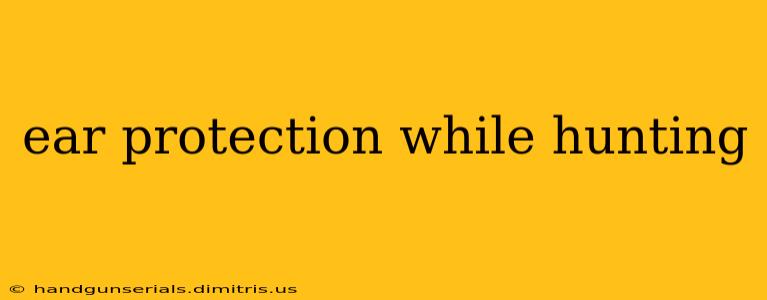Hunting is a thrilling pursuit, connecting us with nature and providing a rewarding challenge. However, the powerful sounds of firearms and the prolonged exposure to environmental noises pose a significant risk to our hearing health. This comprehensive guide explores the critical importance of hearing protection while hunting and provides practical advice on selecting and using appropriate ear protection to safeguard your hearing for years to come.
The Dangers of Noise-Induced Hearing Loss (NIHL) in Hunting
Noise-induced hearing loss (NIHL) is a serious and often irreversible condition. Prolonged exposure to loud noises, even seemingly "normal" hunting sounds, can gradually damage the delicate hair cells in your inner ear, leading to:
- Tinnitus: A persistent ringing, buzzing, or hissing in the ears.
- Hyperacusis: Increased sensitivity to everyday sounds.
- Hearing loss: Difficulty hearing certain frequencies, conversations, or environmental sounds.
Hunting activities, particularly firearm discharge, generate extremely high sound levels capable of causing immediate and permanent hearing damage. Even seemingly quieter activities like the constant drone of wind and wildlife calls can contribute to NIHL over time.
Types of Hearing Protection for Hunting
Choosing the right hearing protection is crucial. The best option often depends on individual preferences, hunting style, and environmental conditions. Here are the main types:
1. Earplugs:
- Foam earplugs: Affordable and readily available, these disposable plugs offer decent noise reduction. Ensure a proper fit for optimal protection.
- Silicone earplugs: Reusable and more comfortable for extended wear than foam plugs. They provide better noise reduction than foam, especially with a good seal.
- Custom-molded earplugs: Professionally fitted to your ear canal, these offer the highest level of comfort and noise reduction. They are a worthwhile investment for frequent hunters.
2. Earmuffs:
- Passive earmuffs: These reduce noise through physical barriers. They are effective against sudden loud noises and offer good all-around protection. Look for models with high Noise Reduction Ratings (NRR).
- Electronic earmuffs: These combine noise reduction with amplification of surrounding sounds. This allows you to hear conversations and environmental cues while protecting your hearing from harmful noise levels. Ideal for situations where awareness of your surroundings is vital.
Choosing the Right NRR (Noise Reduction Rating)
The Noise Reduction Rating (NRR) is a crucial factor to consider when choosing ear protection. A higher NRR number indicates greater noise reduction. However, remember that the actual noise reduction achieved can vary based on the fit and the user. While high NRR is beneficial, it's more important to find a comfortable and properly fitted pair than to prioritize NRR alone.
Practical Tips for Protecting Your Hearing While Hunting
- Always wear hearing protection when firing a firearm. This should be non-negotiable.
- Use hearing protection even during quieter activities. Prolonged exposure to moderate noise can still damage your hearing.
- Maintain proper earplug hygiene. Clean and dry your reusable earplugs to prevent infections. Replace foam earplugs after each use.
- Inspect your earmuffs regularly. Check for any damage or wear and tear that might compromise their effectiveness.
- Educate your hunting partners. Encourage safe hearing practices within your hunting group.
- Consider periodic hearing tests. Regular checkups with an audiologist can help detect and address potential hearing issues early.
Conclusion: Prioritize Your Hearing Health
Hunting is a rewarding pastime, but preserving your hearing is paramount. By understanding the risks of NIHL, selecting appropriate hearing protection, and employing safe practices, you can ensure that you enjoy the thrill of the hunt for years to come without sacrificing your hearing health. Invest in your hearing; it's a priceless asset.

